Get Carter (The Jack Carter Trilogy #1) Read online
Page 2
We were driving along the same road we’d been on since the car park. The lights were getting brighter. In front of us was the main street.
It was a strange place. Too big for a town, too small for a city. As a kid it had always struck me that it was like some western boom town. There was just the main street where there was everything you needed and everything else just dribbled off towards the ragged edges of the town. Council houses started immediately behind Woolworth’s. Victorian terraces butted up to the side of Marks & Spencer’s. The gasworks overshadowed the Kardomah. The swimming baths and the football ground faced each other only yards away from the corporation allotments.
And really it was a boom town. Thirty years ago it had been just another village hiding in the lee of the Wolds. Then they’d found the sandstone. Thirty years later what had been a small village was a big town and would have been bigger if it hadn’t been for the ring of steelworks hemming in the sprawl.
On the surface it was a dead town. The kind of place not to be in on a Sunday afternoon. But it had its levels. Choose a level, present the right credentials and the town was just as good as anywhere else. Or as bad.
And there was money. And it was spread all over because of the steelworks. Council houses with a father and a mother and a son and a daughter all working. Maybe eighty quid a week coming in. A good place to operate if you were a governor who owned a lot of small time set-ups. The small time stuff took the money from the council houses. And there were a lot of council houses. Once I’d scrawled for a betting shop on Priory Hill. Christ, I’d thought, when I’d happened to find out how much they took in a week. Give me a string of those places and you could keep Chelsea. And Kensington. If the overheads were anything like related to what that tight bastard I’d been working for had been paying me.
We pulled up outside The George. It said THE GEORGE HOTEL, but all it was was a big boozer that did bed and breakfast. It was all Snowcemed and the woodwork was painted blue and the windows were fake lattice but I knew inside it was crummy. When I first started going in pubs when I was fifteen, The George was the one boozer I daren’t try. It looked so respectable on the outside. Later I learned different. I still didn’t go in, but for different reasons. But at this moment it suited all right.
The driver whipped round the front of the car and opened my door. I got out. He opened the back door and got the hold-all.
“How much is that?” I said.
“Five bob,” he said.
“Here you are,” I said. I gave him seven and six.
“Thanks, mate,” he said. “All the best.”
He made to take my bag towards the hotel.
“That’s all right,” I said. “I can manage.”
He gave me the bag. I began to turn away.
“Er,” he said, “er, if you’re off to be about during next few days and you need owt, driving anywhere, like, give us a ring. Right?”
I turned to look at him. The blue of the neon and the dead yellow of the high street light made him look as though he needed an oxygen tent. There was an earnest helpful look on his face. Rain looked like sweat on his forehead. I kept looking at him. The earnest helpful look changed.
“I told you,” I said. “I can manage.”
He looked at the hold-all then at me, tracing back my words. He tried to frown, but the little bit of fear made him look more hurt than angry.
“I was only being helpful,” he said.
I smiled at him.
“Goodnight,” I said, and turned away.
I walked towards the door marked SALOON and opened it. I didn’t hear him close his.
Amateurs, I thought. Bloody stinking amateurs. I closed the door behind me.
You had to give the landlord credit. He’d really tried to make it look the kind of place that married couples in their forties would like to come to for the last hour on a Saturday night.
There was that heavy wallpaper in panels, the relief stuff that tried to look as though it was velvet. There was a photo-mural of Capri. There were wall seats in leatherette that looked as though they’d been put in a couple of years ago. There was formica on all the tabletops and also on top of the bar. There was some plastic wrought iron creating a pointless division. There was also a clean shirt on the landlord.
There were a couple of yobboes playing a disc-only fruit machine. There was an old dad with a half-a-bitter and the Racing Green, and sitting next to him there was a very old brass in a trouser suit leaving her lipstick all over a glass of Guinness. But no sign at all of the person I was looking for.
It was quarter past seven.
I walked over to the bar. The landlord was looking at something in the till and thinking. The barman was leaning against the mirror at the back of the bar. He had his arms folded. His hairstyle was Irish Tony Curtis. Farther down the bar was a man of about thirty in a Marks & Spencer cardigan with a lovat green shirt open at the neck. He was sitting on a stool and looking at himself in the mirror.
I put my hold-all down and looked at the barman. He didn’t move.
“Pint of bitter,” I said.
He let his arms unfold, reached out for a pint mug and made his weary way to the pumps and without putting anything more into it than it needed he began to pull the pint.
“In a thin glass please,” I said.
The barman looked at me and the bloke down the bar looked at the barman.
“Why didn’t you bloody well say?” said the barman, slowly putting the brakes on the beer.
“I was going to, but you were too fast for me.”
The bloke down the bar threw back his head and gave a short hard laugh.
The barman looked at the bloke and then looked back at me. The movement took him about thirty seconds. It took him another thirty seconds to decide not to call me a clever sod. Instead he found a thin glass and poured what was in the mug into it and topped it up from the pumps. After another fascinating minute the drink was in front of me.
“How much?” I said.
“One and ten,” said the barman.
I gave him one and ten and went and sat down on one of the leatherette seats as far away from everybody else as possible. I took a long drink and settled down to wait. I was expecting her any minute.
Quarter of an hour passed and I got up and went over to the bar and got Speedy to pull me another pint. I walked over to my seat again, and out of sight, up a flight of stairs, a phone began to ring. The landlord stopped looking at what was or was not in the till and came round the bar and went up the stairs. I sat down and took a sip of my pint and the landlord reappeared at the foot of the stairs.
“Is there a Mr. Carter in the bar?” he said, looking straight at me with that expression all publicans have when they answer the phone for somebody else.
I stood up.
“That’s me,” I said.
He walked back to the bar without bothering to go into any further details. I walked over to the foot of the stairs and followed the distant sounds of the Coronation Street music until I arrived on the landing where the receiver was dangling from the pay phone. I picked it up.
“Hallo?” I said.
“Jack Carter?” she said.
“You were supposed to be here quarter of an hour ago.”
“I know. I can’t come.”
“Why not?”
“Me husband. He’s changed shifts. Ten to two.”
I didn’t say anything.
“I’ve made all the arrangements,” she said.
“What time?”
“Half-past nine.”
“Did you get the flowers?”
“Yes.”
I took out a cigarette.
“Is Doreen at the house?”
“No. She’s staying with a friend.”
“Who’s with him then?”
“I don’t know.”
“He’s not on his own, is he?”
“I don’t know.”
“Well you’d better go round and find out
then.”
“I can’t.”
“Why not?”
“Same reason as I couldn’t meet you.”
Silence.
“Look,” I said, “when can I see you?”
“You can’t.”
“Will you be there tomorrow?”
“No.”
“Now look …”
“Door’s on the latch,” she said. “He’s in the front room.”
She rang off. I looked at the dead receiver for a few seconds, then put it back on the hook and went down the stairs and finished my pint standing up. Then I picked up my hold-all and went out into the rain.
I walked away from The George, turning left down a dark street of terraced houses with narrow front gardens. Above the rain and the blackness low clouds touched with pink from the steelworks sidled across the sky. I turned left again into another street exactly the same as the first except that at the end of it was a stretch of narrow road that ran out of the town between the steel works and up into the Wolds. I walked to the end of the street and opposite me on the other side of the exit road was Parker’s Garage and Car Hire.
I crossed the road and tapped on the office door. Nobody was in sight. I tapped again, harder. A door beyond the filing cabinet opened. A man in overalls and a woollen hat with a bobble on top appeared. He crossed the office and opened the door.
He looked into my face and waited for me to tell him what I wanted.
“I’d like to hire a car,” I said.
“How long for?” he said.
“Only for a few days,” I said. “I shan’t be staying long.”
I drove up through the town but via the back routes that paralleled the High Street until I came to Holden Street, a street in which I knew every other house did Bed and Breakfast; after Frank had been buried I didn’t want to operate from the house, not with Doreen around. I didn’t want her involved unless I could help it. I found one with a garage and parked the car in front of the house, walked up the path and knocked on the door and waited.
The house had gabled windows and a mean little porch. The top half of the front door was panelled in opaque glass with a border of little squares of coloured glass running along the top and the two sides. On either side of the door there were two more panels exactly the same except that they were narrower. Inside the hall a shadow approached the front door and opened it.
She wasn’t bad. About forty, probably the right side of it, hair permed, squarish face, well powdered, big tits, open-necked blouse shoved tight into her skirt. No nonsense with the wrong people but what about the right ones?
She looked as though she might be pleased to see me.
“Am I in luck?” I said.
“What for?” she said.
“A room. Have you any vacant?”
“We have.”
“Oh, good,” I said. She stepped back to let me in. I hesitated.
“Look,” I said, “the point is, I don’t actually need one right now, tonight that is, it’ll be tomorrow and Saturday, maybe Sunday.”
She altered her stance, resting all her weight on one leg.
“Oh, yes?” she said.
“Yes, you see. I’m staying with a friend for tonight, but you know how it is, it won’t be convenient tomorrow, you know.”
“Her husband changes shifts tomorrow, does he?”
“Well, er, it’s not exactly like that,” I said.
“No,” she said, beginning to turn away, “it never is.”
“There’s one other thing,” I said.
She turned back and adopted the stance again.
“See, I’ve got a car, and I know it’d be all right if I left it in the road, but I notice you’ve got a garage and I was wondering if it was empty if maybe I could put it in there. Tonight, like.”
She carried on looking at me.
“I mean,” I said, “I’ll pay.”
She looked at me a bit longer.
“Well, you can hardly park it outside her house, can you?” she said.
“Thanks,” I said, following her in, “that’s very nice of you, it really is.”
“I know,” she said.
She began to go up the stairs. Her legs were all right, and so was her bum, muscular but not as big as it would have been if she didn’t look after herself. When she got to the top of the stairs she turned round while I was still watching her.
“Traveller are you?” she said.
“You could say that,” I said.
“I see,” she said.
She crossed a landing and opened a door.
“Will this do?” she said.
“Oh yes,” I said. “Just the job.” I looked all round to show her how much I appreciated it. “Just the job.” I took my wallet out. “Look, I’ll pay now and if you like I’ll pay for tonight just to keep the room open.”
“That’d be a bloody silly thing to do,” she said. “You’re first one since Monday.”
“Oh, well, if you’re sure,” I said. “How much?”
“Fifty bob for two nights. Bed and breakfast. A pound’ll do for garage. Let us know Sunday morning if you’re staying.”
I took out the money and gave it to her. She folded it up and pushed it in her skirt pocket. It was a tight fit.
“And as I say,” I said, “I’ll pop round tomorrow tea-time and move it then if that’s all right.”
“Whenever you like.”
“Good,” I said.
We walked down the stairs. At the door she said:
“I’ll open garage for you.”
I got in the car, reversed it and drove it up the bit of drive and sat there. She pushed up the sliding door. I drove in and got out.
“Look,” I said, “will you be in all day tomorrow?”
“Why?”
“Well, I might need the car tomorrow afternoon and I’d like to collect it if you’ll be here.”
“I’ll be here all day after twelve,” she said.
“Oh, good,” I said. “Fine.”
I walked out of the garage. I turned to face her.
“And thanks again.”
She just stared at me with no expression on her face although there was something there way back that might have been a smile, although if she’d have allowed it to surface it would have been a sarcastic one at that. She stopped staring and began to close the garage door.
I walked down the drive and on to the pavement and turned in the direction of the High Street. I smiled. It amused me, the picture she’d got of me, the way she thought she’d got me weighed up. It might turn out to be helpful.
As I got closer to the High Street I noticed it wasn’t raining any more.
I turned left and walked up the High Street. I passed the Oxford Cinema and Eastoes Remnants and Walton’s sweetshop. When we were lads Walton’s doorway was where we always used to stand and watch the world go by. It was the best doorway in the High Street. Big enough to accommodate about twelve lads and in winter it was the least draughty. Pecker Wood, Arthur Coleman, Piggy Jacklin, Nezzer Eyres, Ted Rose, Alan Stamp. We all used to congregate there before the pictures and if we didn’t have the money for the pictures we’d stand there until it was time for us to go home. Jack Coleman, Howard Shepherdson, Dave Patchett. I wondered what had happened to them all.
And of course Frank. But I knew what had happened to him.
And that was something I was going to put right.
Now I was at Jackson Street. On the corner where Rowson’s Grocers used to be was the same shop with the same thirties front but it had been painted yellow (the woodwork, the window frame) and instead of Rowson’s Family Grocer on the fascia it said Hurdy Gurdy in Barnum & Bailey lettering and behind the glass instead of Dandelion and Burdock bottles on faded yellow crêpe paper and instead of Player’s Airmen show cards and Vimto signs there were poove clothes and military uniforms and blow-ups of groups. The shop butted up against the row of villa-type bay windowed houses that ran down one side of Jackson Street and up the
other. At the end of the street a long way away was an iron railing fence and beyond that there used to be the waste ground, the browny yellow grass that led you to the drain, the narrow soggy dyke where Frank and I and others would go up and drop down out of sight of the villas and do anything we wanted to do. At least, I used to, and some of the others, but when Valerie Marshbanks showed everybody her knickers and charged a penny a wank, in the bushes, one at a time with Christine Hall who liked to watch, Frank would never be there, but he’d know what was going on, and when I’d get home, he’d be reading his comic, and he wouldn’t say anything to me, he’d just make me feel fucking awful, and very often he’d keep it up so long that Mam would tell him to straighten his bloody face up else get to bed and he’d just pick up his comic and go up, not looking at me. And when I’d go up, the light would be off, and I’d know he was awake, and that would be worse, having to get in bed in the dark listening to him thinking. I wouldn’t be able to get to sleep for ages because he’d be there awake and I’d be awake because I hardly dared breathe knowing he was thinking about me.
I walked along Jackson Street. Now at the end the railings were still there and some of the grass, but the dyke wasn’t, it had been filled in and there was a small light engineering works, yellow brick under the street light with a lathe on overtime inside.
I got to number forty-eight. The curtains were drawn, of course, but there was a light on in the hall illuminating the frosted glass panels and the privet hedge four feet away from the bay windows.
I opened the front door.
There was new wallpaper on the wall, contemporary, with lobster pots and fishermen’s nets and grounded single masted-yachts, all light browns and pale greens. He’d hardboarded the banisters in, and painted the hardboard and put pictures going upwards below the rail. There was a crimson fitted carpet on the hall and going up the stairs and the light fitting was triple-stalked in some fake brassy material.
I went into the scullery.
On either side of the chimney breast he’d built units in tongue and groove. On one side there was the T.V. neatly boxed in and some little open compartments with things like framed photos and glass ornaments and fruit bowls in them. One compartment had newspapers the T.V. Times and the Radio Times neatly slotted into it. The unit on the other side was for his books.

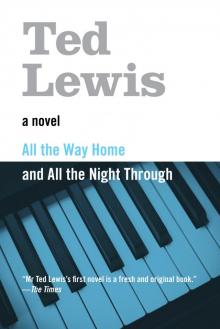 All the Way Home and All the Night Through
All the Way Home and All the Night Through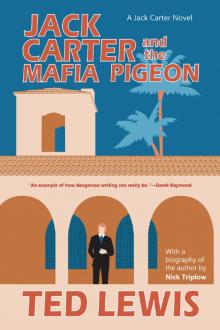 Jack Carter and the Mafia Pigeon
Jack Carter and the Mafia Pigeon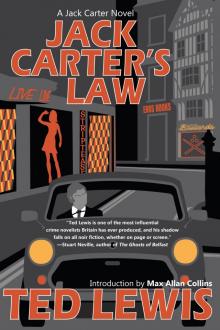 Jack Carter's Law
Jack Carter's Law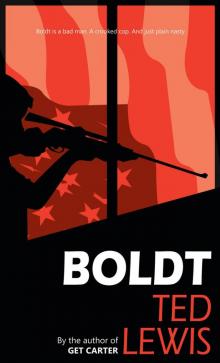 Boldt
Boldt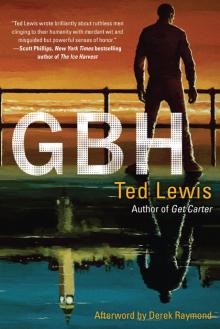 GBH
GBH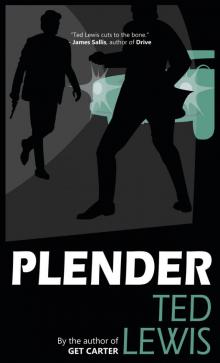 Plender
Plender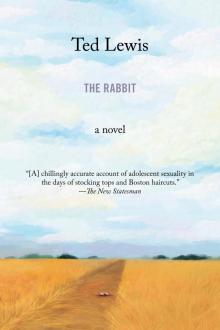 The Rabbit
The Rabbit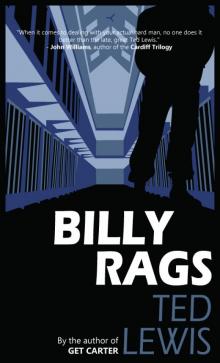 Billy Rags
Billy Rags